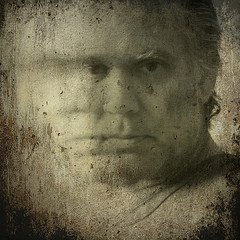Two of my passions -- the music of Loudon Wainwright III and the unelection of George W. Bush -- have come together in recent months.
So Damn Angry
By Bob Stanley
He has embraced politics and knows all about MP3. What on Earth happened to Loudon Wainwright III?
"WOW! Hats off, man! That is great."
I have just told the famously grumpy Loudon Wainwright III, who plays the Meltdown festival in London later this month, that I can't listen to his latest record because I don't, as yet, have a computer at home.
"I put it off for years, but I caved," he replies.
Now he can't get enough of it, using the MP3 format as a political tool. The song is called Presidents' Day.
"Everywhere I go there's an intense revulsion to George Bush. I just played in Ghent, Belgium, and Lerwick in the Shetland Islands, and the reaction is even stronger in Europe. They always cheer in exactly the same place."
The author of I Don't Think That Your Wife Likes Me and Be Careful There's a Baby in the House is not known for political broadsides. The son of a journalist, he never even wanted to be a songwriter but was given a guitar at the age of 14. "That got me going. Before you knew it, I'd written a song about a lobster fisherman."
Soon he was writing two songs a week, and being hailed by the post-Woodstock crowd as the new Dylan. Since 1969 he has played the angry son, the ardent lover, the young parent, the divorcé; his songs are conversations over the breakfast table, or cryptic comments when you turn out the light. Guilt is always on the menu, sexual politics too. "It's a good topic — there are always men and women in the audience."
For Wainwright 1982 was a pivotal year. He recorded the album Fame and Wealth in Britain and it was stripped back — no beard, no disco, no concessions to Hall and Oates — and caused a small commotion among those who had written him off. His next album, I'm Alright, in 1985, was nominated for a Grammy.
"My records started to get better and clearer, I found my footing in the Eighties. And the Grammy nomination felt great; it felt like I'd redeemed myself."
The appeal of those early albums lay in a fierce, black sense of humour (Glad to See You've Got Religion) and a playfulness about sex and death (Nice Jewish Girls, Suicide Song) which made him the missing link between Bob Dylan and Lenny Bruce.
"I'm a fan of those records but I don't feel connected to them," he says. "My voice is so much higher. It's not just that I was younger; it sounds like a different person."
A standout was the dry and lonesome life-on-the-road ballad Motel Blues from Album II, covered by Big Star and still lauded by young touring bands such as the Futureheads. Wainwright once played it on a women's lib radio programme in Chicago. The presenter of the show suggested that his genitals should be removed.
"There was an intensity and starkness on those records that critics like John Peel liked. It seemed strange then for a singer/songwriter not to have bass or drums or orchestration. Arif Mardin produced my initial sessions when I signed to Atlantic in 1969 and put me in the studio with the cream of the Atlantic musicians, but I felt really uncomfortable.
"My heroes had made voice and guitar records: Bill Monroe, Bob Dylan. Then I was dropped by Atlantic so of course I relented, used other musicians and had a hit single.So they were right from the start!"
While Britain suffered Nice One Cyril, Wainwright's Dead Skunk was the novelty hit of 1973 in the States. A 14-year-old girl wrote to Wainwright to say it was the cruellest, saddest song she had ever heard, but at his shows "guys jumped around, girls jumped around, it was very exciting. I made a lot of money that year. Years of therapy have uncovered the fact that I have an ambivalence to fame. After Dead Skunk, my ambivalence kicked in like gangbusters. I grew a beard. I felt guilty about having a record on the radio."
His next album, the fine Attempted Mustache, bombed ("It didn't have a song about a dead animal on it") and Wainwright's career drifted through some very tired records with bored session musicians, leading up to a chilly denouement in Guildford. "Now, of course, I'm desperate for fame and willing to sell my soul," he says.
A regular at the Cambridge folk festival, endorsed by Morrissey, proud parent of singers Rufus and Martha, Wainwright also had a song (The Man Who Couldn't Cry) covered by Johnny Cash — fame enough for most 58-year-old songwriters. "As far as proud moments go that's right up there. I was so pleased he chose it. And he got laughs on his version."
He is also a regular on Air America, the newly set-up left-leaning talk-radio station.
Thirty-five years on from his debut, Wainwright is a born-again teen rebel. "I've never been as politically active as I should have been. I never wanted to be Phil Ochs. But things are so dire, we've got to fight against apathy towards the current administration."
He'll be playing Presidents' Day for the next few months at John Kerry fundraisers.
Wainwright's last studio album, Last Man on Earth, was an angry-old-man rant — computers and mobile phones were high on the agenda. It coincided with the election of George Bush. Wasn't he feeling so political five years ago?
"Uhhh . . . I'm ashamed to say I played Ralph Nader benefits. Now I feel really guilty about that."
Download Loudon's "Presidents' Day".

No comments:
Post a Comment